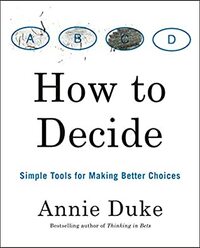Take a photo of a barcode or cover
I really liked this book. My big takeaway is from the very first section and it is to remove results from my mental measure of whether or not I made a good decision. I (like most people apparently) tend to rely on what I think of how things turned out to measure my decision making. Which is clearly flawed.
I also really love the idea of coming up with a bunch of different outcomes, assigning their probability, and letting that help me choose things.
I wish I had purchased this book and could reference it regularly, but the information is valuable even if I only held it for a while.
I also really love the idea of coming up with a bunch of different outcomes, assigning their probability, and letting that help me choose things.
I wish I had purchased this book and could reference it regularly, but the information is valuable even if I only held it for a while.
medium-paced
I really liked Annie Duke's previous book, "Thinking in Bets", so was looking forward to this one. This book suffers a bit from the common sophomore curse, where it looks like her publisher pushed her hard to crank out another book quickly to capitalize on the success of the first. The book is still good, but it is a good deal lighter than the first. Still, there is a lot of useful stuff here. The content is made even more usable with the inclusion of many practical exercises that can help drive home the ideas. I can recommend this book for anyone who wants to approach their decision-making process in a more structure and practical and repeatable way.
Each chapter could easily be a full length book, but only the most important features are included. Really great book, quick read.
fast-paced
All decisions, big and small, require some thought, but the way we approach them is usually inconsistent. This makes learning from past mistakes – and successes – challenging. Once an outcome to a decision is known, we usually can’t remember exactly what we knew or thought during the decision-making process. Without a clear understanding of that, we can’t accurately analyze what went well and what didn’t. By talking about probabilities in precise terms, eliciting unbiased feedback, and tracking our knowledge from the decision to the outcome, we can extract valuable lessons to inform future decisions. If we’re honest about how much we don’t know, and then work to chip away at the unknown, we can bridge the gap between a random prediction and an educated guess.
It’s helpful for a basic understanding of strategies for daily decision making. You’ll need more than this book for big decisions
This was a great book that showed how to break down the decisionmaking process and make better decisions. My main critique is that it is part book and part workbook, so the Kindle version is not the best one to use if you want to do all the exercises and keep them with the book. (You can highlight and make notes, or use a separate book, but it's not all together.)
I think I need to re-read this one! But I liked that one of Duke's big takeaways is that a decision is not "good" or "bad" based on the outcome. You can make a good decision and still have a poor outcome and vice versa. That was really eye opening for me!
informative
reflective
slow-paced


